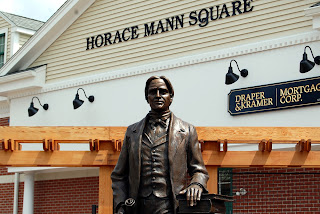"As you may have seen recently in the local print and in social media, BFCCPS has been listed as the main driver of the budget deficit for the Franklin Public School system. Many current and former parents and faculty have shown great support for BFCCPS on social media over the last few weeks.
Please know that several pieces of information that have been reported are inaccurate. For example, while various articles report 258 new students attending our school next year; only 95 students from Franklin have accepted offers of enrollment for the 2019-2020 school year. As we have 31 grade eight students who will be attending Franklin High School next year, the true impact is only a net of 64 new students attending BFCCPS from the town of Franklin next year. Additionally, articles have repeatedly indicated that our expansion includes a High School offering. We have no plans to expand to grades 9-12.
When we began our expansion process in 2012, we were intentional in designing our region to have a lessening impact on the town of Franklin. In fact, next year, even with expansion, we will enroll fewer children from the Town of Franklin than before we became a regional school in the 2015-2016 school year."Continue reading the full write up on the Charter School page
http://bfccps.org/clarification-on-the-impact-of-bfccps-on-the-franklin-public-school-systems-budget/?doing_wp_cron=1556970363.0868589878082275390625
The Town of Franklin has updated their memo that incorrectly reported the expansion would include grades 9-12. The updated memo can be found online
https://www.franklinma.gov/sites/franklinma/files/uploads/fy20_budget_forecast_and_beyond_0.pdf
Per the Charter School the enrollment increase projected for Franklin should be less than shown in the Dept of Local Service Cherry Sheet estimates but until the numbers flow through the State, the budget impact to Franklin is still a significant increase over prior years ('significant' is currently shown at $1M).
DLS Cherry Sheet estimates:
The 'cherry sheet' reflects the local aid coming to Franklin or assessed against Franklin. Chapter 70 is the school aid. There are also lines shown for the charter school ins and outs.
I have filtered on the DLS page to select Franklin and export to create the PDF shown here. You can view the info online
https://dlsgateway.dor.state.ma.us/reports/rdPage.aspx?rdReport=CherrySheets.CSbyProgMunis.MuniBudgEst
Bottom line: the school funding calculations provided by the State short change all Franklin students, period. There should not be a charter vs. public school debate. We should be united in getting a more realistic funding formula. Why? Whatever is allocated for the Franklin Public School students will flow to the charter school students, so if there is more for one there will be more for the other. If the public school budget is cut (as it will be this year), the Charter School student will ultimately see that (in some manner - I am not an expert on State funding flows, but from my experience that is what will likely happen).
 |
| Horace Mann statue in downtown Franklin, the father of public education |





